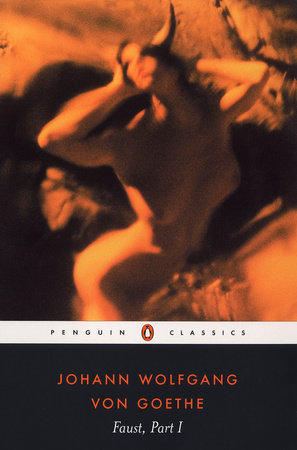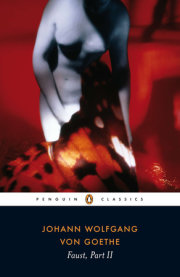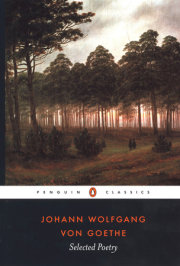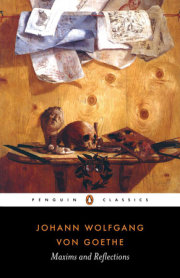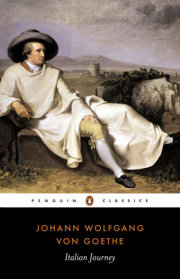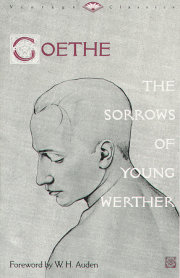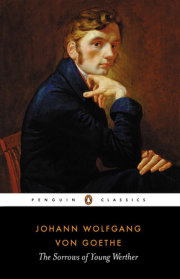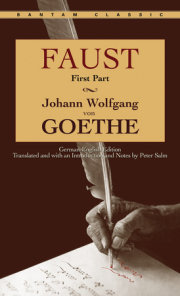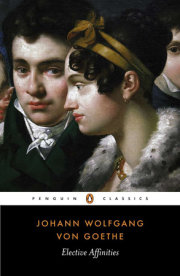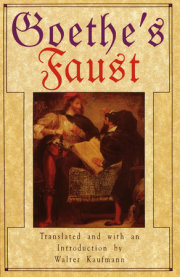Dedication OneWavering forms, you come again;
once long ago you passed before my clouded sight.
Should I now attempt to hold you fast?
Does my heart still look for phantoms?
You surge at me! Well, then you may rule
as you rise about me out of mist and cloud.
The airy magic in your path
stirs youthful tremors in my breast.
You bear the images of happy days,
and friendly shadows rise to mind.
With them, as in an almost muted tale,
come youthful love and friendship.
The pain is felt anew, and the lament
sounds life's labyrinthine wayward course
and tells of friends who went before me
and whom fate deprived of joyous hours.
They cannot hear the songs which follow,
the souls to whom I sang my first,
scattered is the genial crowd,
the early echo, ah, has died away.
Now my voice sings for the unknown many
whose very praise intimidates my heart.
The living whom my song once charmed
are now dispersed throughout the world.
And I am seized by long forgotten yearnings
for the solemn, silent world of spirits;
as on an aeolian harp my whispered song
lingers now in vagrant tones.
I shudder, and a tear draws other tears;
my austere heart grows soft and gentle.
What I possess appears far in the distance,
and what is past has turned into reality.
Prelude in the Theater
Manager, Dramatic Poet, Comic Character.
ManagerYou two who often stood by me
in times of hardship and of gloom,
what do you think our enterprise
should bring to German lands and people?
I want the crowd to be well satisfied,
for, as you know, it lives and lets us live.
The boards are nailed, the stage is set,
and all the world looks for a lavish feast.
There they sit, with eyebrows raised,
and calmly wait to be astounded.
I have my ways to keep the people well disposed,
but never was I in a fix like this.
It's true, they're not accustomed to the best,
yet they have read an awful lot of things.
How shall we plot a new and fresh approach
and make things pleasant and significant?
I'll grant, it pleases me to watch the crowds,
as they stream and hustle to our tent
and with mighty and repeated labors
press onward through the narrow gate of grace;
while the sun still shines--it's scarcely four o'clock--
they fight and scramble for the ticket window,
and as if in famine begging at the baker's door,
they almost break their necks to gain admission.
The poet alone can work this miracle
on such a diverse group. My friend, the time is now!
PoetOh, speak no more of motley crowds to me,
their presence makes my spirit flee.
Veil from my sight those waves and surges
that suck us down into their raging pools.
Take me rather to a quiet little cell
where pure delight blooms only for the poet,
where our inmost joy is blessed and fostered
by love and friendship and the hand of God.
Alas! What sprang from our deepest feelings,
what our lips tried timidly to form,
failing now and now perhaps succeeding,
is devoured by a single brutish moment. 70
Often it must filter through the years
before its final form appears perfected.
What gleams like tinsel is but for the moment.
What's true remains intact for future days.
ComedianOh, save me from such talk of future days!
Suppose I were concerned with progeny,
then who would cheer our present generation?
It lusts for fun and should be gratified.
A fine young fellow in the present tense
is worth a lot when all is said and done.
If he can charm and make the public feel at ease,
he will not mind its changing moods;
he seeks the widest circle for himself,
so that his act will thereby be more telling.
And now be smart and show your finest qualities,
let fantasy be heard with all its many voices.
ManagerAbove all, let there be sufficient action!
They come to gaze and wish to see a spectacle.
If many things reel off before their eyes,
so that the mob can gape and be astounded,
then you will sway the great majority
and be a very popular man.
The mass can only be subdued by massiveness,
so each can pick a morsel for himself.
A large amount contains enough for everyone,
and each will leave contented with his share.
Give us the piece you write in pieces!
Try your fortune with a potpourri
that's quickly made and easily dished out.
What good is it to sweat and to create a whole?
The audience will yet pick the thing to pieces.
PoetYou do not feel the baseness of such handiwork.
How improper for an artist worth his salt!
I see, the botchery of your neat companions
has been the maxim of your enterprise.
ManagerSuch reproaches leave me unperturbed.
A man who wants to make his mark
must try to wield the best of tools.
You have coarse wood to split, remember that;
consider those for whom you write!
A customer may come because he's bored,
another may have had too much to eat;
and what I most of all abhor:
some have just put down their evening paper.
They hurry here distracted, as to a masquerade,
and seek us out from mere curiosity.
The ladies come to treat the audience to their charms
and play their parts without a salary.
Now are you still a dreamer on poetic heights?
And yet content when our house is filled?
Observe your benefactors at close range!
Some are crude, the others cold as ice.
And when it's finished, this one wants a deck of cards
and that one pleasure in a whore's embrace.
Why then invoke and plague the muses
for such a goal as this, poor fools?
I say to you, give more and more and always more,
and then you cannot miss by very much.
You must attempt to mystify the people,
they're much too hard to satisfy--
What's got into you--are you anguished or ecstatic
PoetGo find yourself another slave!
The poet, I suppose, should wantonly give back,
so you'd be pleased, the highest right
that Nature granted him, the right of Man!
How does the poet stir all hearts?
How does he conquer every element?
Is it not the music welling from his heart
that draws the world into his breast again?
When Nature spins with unconcern
the endless thread and winds it on the spindle,
when the discordant mass of living things
sounds its sullen dark cacophony,
who divides the flowing changeless line,
infusing life, and gives it pulse and rhythm?
Who summons each to common consecration
where each will sound in glorious harmony?
Who bids the storm accompany the passions,
the sunset cast its glow on solemn thought?
Who scatters every fairest April blossom
along the path of his beloved?
Who braids from undistinguished verdant leaves
a wreath to honor merit?
Who safeguards Mount Olympus, who unites the gods?
Man's power which in the poet stands revealed!
ComedianVery well, then put to use those handsome powers
and carry on the poet's trade,
as one would carry on a love affair.
One meets by accident, emotes, and lingers,
and by and by one is entangled,
one's bliss increases, then one is in trouble;
one's rapture grows, then follow grief and pain,
before you know, your story is completed.
We must present a drama of this type!
Reach for the fullness of a human life!
We live it all, but few live knowingly;
if you but touch it, it will fascinate.
A complex picture without clarity,
much error with a little spark of truth--
that's the recipe to brew the potion
whence all the world is quenched and edified.
The fairest bloom of youth will congregate
to see the play and wait for revelation;
then every tender soul will eagerly absorb
some food for melancholy from your work.
First one and then another thing is stirred,
so each can find what's in his heart.
Copyright © 1988 by Johann Wolfgang Von Goethe. All rights reserved. No part of this excerpt may be reproduced or reprinted without permission in writing from the publisher.

